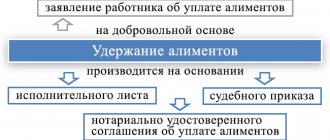Is alimony collected from the pension?
Content
A pension is a state benefit paid to citizens for old age, disability or other circumstances. According to Government Decree No. 841 of July 18, 1996, alimony from pension benefits is subject to withholding.
Several factors influence the amount of alimony:
- the amount of pension provision;
- number of children, form of punishment;
- living wage.
Let's consider from which pensions alimony is and is not withheld:
| Paid | Not paid |
| on disability | for the loss of a breadwinner |
| old age | surcharges for hazardous working conditions |
| by length of service | one-time compensation |
| social |
Useful video
We invite you to watch a video on the topic:
What to do if a citizen obligated for alimony himself belongs to vulnerable social strata of the population or, thanks to some special merits, enjoys state financial support. Is alimony taken from the pension, how is collection carried out in this case, in what amount - these questions are asked for obvious reasons, because a pension, in fact, is a form of social security and often the only source of livelihood.
This article will help you understand this topic - it will tell you in favor of which category of needy disabled family members alimony is paid from pension payments, and from which types of pensions deduction is not made. The article also contains information about who and how determines the amount of alimony payments, how collection occurs and what documents will be needed if the payer is a pensioner.
Who has the right to collect alimony from a pension?
According to the RF IC, alimony may be collected for the maintenance of the following categories of citizens:
- spouses and former spouses;
- minor children;
- adult disabled children;
- parents;
- grandparents;
- stepfathers and stepmothers;
- brothers and sisters.
Collection of alimony is carried out in three ways: by concluding an alimony agreement with a notary, by way of claim or writ proceedings.
If we are talking about withholding payments to parents and other relatives, the funds are recovered only through legal proceedings or execution of an agreement.
How does collection occur?
Citizens, if there is an agreement on the amount of material support for children, have the right to enter into an agreement in which all the conditions of material support will be spelled out. As a rule, it prescribes specific amounts that are taken from the parent to support the child on a monthly basis. It is recommended that such an agreement be certified by a notary.
If the parents cannot reach an agreement on the procedure for paying child support, then the court will establish it. To do this, the parent with whom the child lives should apply for a court order. If there are no objections from the person obligated to pay alimony, then after receiving the document it is necessary to contact the bailiff department, where enforcement proceedings will be initiated on the basis of this document.
If a citizen challenges the court order, then the case will be considered in the manner of a lawsuit, based on the results of which the judge will make a decision and, depending on its content, will issue a writ of execution. It will need to be provided to the bailiffs.
List of documents
When applying to court to collect alimony, you must submit the following documents:
- application for a court order;
- copies of the applicant's passport;
- marriage certificate (divorce);
- children's birth certificates;
- papers confirming the fact that the child lives with the applicants (for example, a certificate of family composition).
Attention! In this case, there is no need to pay a state fee when submitting an application.
All citizens, regardless of their status and health, have responsibilities to provide financial support for their children. In accordance with the norms of domestic legislation, alimony can be withheld from any income of a citizen, including pensions. Recipients of disability payments pay alimony on a general basis. There are no concessions for them in this case.
Shape, size and features of collection
The Insurance Company establishes several forms of collecting alimony payments:
- as a share of earnings;
- in a fixed amount of money (TDS);
- in a mixed form, combining the two above.
Let's consider when a specific form is assigned:
| Share | If the exact amount of earnings (pension) of the payer is established |
| TDS | If the person obligated for alimony does not have an official job, he receives a salary in foreign currency, or “floating” income (for example, individual entrepreneur) |
| Mixed | This is relevant when the payer has two types of income – stable and “floating” |
The TDS collects alimony for the maintenance of spouses and relatives. Children can be restrained in any of three ways, depending on the specific situation.
Per child
Parents' alimony obligations towards children are established by Ch. 13 IC RF. It is allowed to collect mixed, TDS or alimony in shares.
Let's look at examples where one of the options:
In shares of pension
Citizen Astakhov O.V. receives an insurance pension in the amount of 12,000 rubles. Of these, 25% is paid per minor son. How is the calculation made:
12,000 x 25% = 3,000 rubles.
Here, the amount of payments is significantly lower than the minimum monthly wage per child, but it will not be possible to recover a large amount, since the court takes into account the financial situation of the parties. Pensioners often require medications, and if the amount of payment is increased, their rights to ensure minimal needs will be violated.
In a fixed amount of money
Volnov P.I. receives 15,000 rubles. pensions and alimony for one daughter are 25% or 3,750 rubles. After paying alimony, the person obligated to receive alimony is left with 11,250 rubles. The minimum monthly wage per child in the region is 9,000 rubles. Guided by Art. 83 of the RF IC, which talks about the possibility of collecting payments in TDS in case of a significant violation of the interests of the child, the recipient filed a claim to change the method of payment from equity to TDS, arguing that the daughter’s needs were not met and the significant difference between the PM and the father’s actual payments.
The claims reflect the recovery of half of the PM, i.e. 4500 rub. The plaintiff's salary is 10,000 rubles. The combined income of the payer and recipient does not allow them to adequately provide for the child.
Having considered the case materials, the court satisfied the claims: the plaintiff’s earnings are negligible, 90% of expenses go to the child. The woman has no help from relatives. The person obligated to pay alimony spends the pension only on himself, in addition to alimony. There are no medical needs or other valid reasons for rejecting the claim.
If the plaintiff had a high salary, the court would most likely reject the claim, arguing that it was the difference in the financial situation of the parties.
For a spouse or ex-spouse
In accordance with Art. 91 of the RF IC, alimony for the maintenance of spouses or former spouses is collected in the TDS, taking into account the financial situation of the parties.
Alimony is collected from spouses during marriage and for 1 year after its dissolution in the following cases:
- disability and neediness;
- wife's pregnancy, maternity leave for up to 3 years;
- the need of a spouse caring for a disabled child under 18 years of age or an adult child with a childhood disability of group 1.
Since the defendant is a pensioner, the total amount of his income is taken into account. If the pension is minimal and there is no additional income, then the payment can be assigned in the minimum amount (500 rubles).
If there is additional income, the court will take into account their regularity and amount:
- wage;
- funds from renting out an apartment;
- availability of funds on deposits.
However, the existence of additional income must be proven. This responsibility rests with the plaintiff.
For parents
According to Art. 87 of the RF IC, disabled parents in need have the right to collect alimony from able-bodied adult children in the TDS. The amount of payments is determined in proportion to the number of children, taking into account the financial situation of the court.
If the defendant is a pensioner, he has the right to file a counterclaim or raise an objection, indicating that he himself needs financial assistance due to the high costs of medicine.
The plaintiff must prove to the court that the defendant has sufficient income to meet his and his own needs.
The legislative framework
Almost half of the population is officially disabled.
These include:
- minor children who, due to their young age, do not have the opportunity to earn their own income;
- elderly citizens who have been assigned pension benefits;
- persons with disabilities who have been assigned a disability group in accordance with the degree of labor loss.
Moreover, within the framework of family law, all of the above categories have the right to alimony maintenance under certain conditions:
- Children are entitled to alimony due to the norms of Article 80 of the RF IC if one of the parents evades voluntary financing of all children's expenses, which is important in case of divorce and the same dad moves to another place.
- Elderly citizens are paid alimony within the framework of the norms of Article 87 of the RF IC if they, even with an old-age or disability pension, cannot cover all necessary expenses and really need additional help from their own adult children. By the way, the obligation to support an elderly citizen is also enshrined in Article 90 of the RF IC in relation to former spouses who became disabled even after a divorce.
The obligation to support disabled people who, being adults, are not able to financially cover all their expenses for treatment and daily care has been determined.
In this case, several categories may act as defendants for alimony maintenance:
- parents who, within the framework of the norms of Article 85 of the RF IC, are obliged to support disabled children even after 18 years of age;
- adult children in accordance with the norms of Article 87 of the RF IC;
- spouses within the framework of Article 90 of the RF IC.
By virtue of the norms of Chapter 15 of the RF IC, alimony obligations can be imposed not only on children or parents and spouses, but also on other relatives - the same brothers and sisters, grandparents, stepsons and stepdaughters, but only if other relatives no longer alive.
Thus, the law defines a fairly wide list of persons who have the right to count on alimony in the event of a difficult financial situation. Are persons who are included in the above categories of disabled citizens obliged to provide assistance to other persons with the same status? And from what funds should alimony be deducted if the only income of the same pensioner or disabled person is only a pension benefit?
The answer to these questions is contained in the Family Legislation of the Russian Federation and in Decree of the Government of the Russian Federation of July 18, 1996 N 841, which regulates an exhaustive list of income from which alimony can be collected, where clause A, part 2 precisely contains pensions of all types .
Grounds for reducing alimony from pension
The amount of payments for children is reduced when payers file claims on the following grounds:
- difficult financial situation;
- disability and need for regular purchase of medications;
- the appearance of other dependents for whom alimony has to be paid.
A reduction in the amount of alimony is allowed only by a court decision on a counterclaim or presentation of an objection by the defendant. It is also possible to reduce payments after the payment has been assigned by filing a claim.
Advantages of drawing up a settlement agreement
The parties have the option not to go to court. To do this, they will need to agree on the payment of alimony on their own by drawing up an agreement. This document contains all the conditions for the payment of alimony, its amount, and frequency of transfer. You can also specify additional conditions that best suit the life circumstances of the parties.
The agreement will need to be certified by an employee of the notary agency - only after that it will acquire the force of executive documentation.
Lawyer's answers to frequently asked questions
Can money be withdrawn from the EDV pension for alimony?
Yes, all bonuses and additional payments to the pension in accordance with Government Decree No. 841 are subject to consideration when calculating alimony.
Is alimony collected from the funded part of the pension?
No. The funded part is formed from the salary from which alimony is already withheld. In addition, payments are not included in the list established by PP No. 841.
Is it possible to collect alimony from a pensioner in a fixed amount?
Yes, if the amount of payments in shares violates the interests of the child and does not meet his needs. When making a decision, the court takes into account the financial situation of the plaintiff and defendant.
What is the maximum percentage of alimony collection from a pensioner?
For three children, 50% is withheld. When collecting payments from spouses, the amount may increase to 70%, provided that the pensioner is not in need.
Yes or no?
Question:
Is alimony paid to the pension income of a former employee of the Ministry of Internal Affairs, and is the payment procedure changed for him?
Answer:
Definitely paid. The Resolution clearly stipulates that collections can be made from pensions. There are no provisions in the law regarding exemptions and concessions for employees of the Ministry of Internal Affairs. Consequently, a standard payment procedure is provided for these parents, the same grounds and procedure as for civilians. The article of the law determines the specifics of paying alimony.
How to reduce the amount of alimony?
The decrease also occurs in two cases. Parents can, by mutual agreement, reduce the amount of payments. Or alimony is reduced by decision of a judicial authority in the presence of exceptional circumstances. These reasons include:
- the financial situation of the pensioner has worsened, for example, he receives the minimum pension, after deducting alimony, his cost of living will not correspond to the standard of living;
- the financial condition of the mother with whom the child remained to live, on the contrary, has improved, she is able to provide a decent standard of living for the teenager herself;
- a newborn appeared in the new family of the alimony payer, and therefore his expenses increased;
- another disabled person has appeared who requires financial support from a pensioner;
- the assigned amount of alimony is too high, so it is necessary to recalculate downward.
To consider the case, the pensioner must submit to the court a statement of claim and supporting documents (certificates of income, paper on withheld amounts of alimony, medical certificates of disability, certificates of newly born children, etc.).
Who can demand payment of alimony?
Most often, the role of the claimant is the parent with whom the child remains to live. In addition, another legal representative may make a demand for payment of alimony:
- guardian if parents are deprived of parental rights;
- representatives of the guardianship department to protect the rights and interests of the child;
- employees of a specialized institution (if the parents abandoned the child, he is now in a boarding school for disabled children).
In the first case, the listed alimony can be immediately spent on the needs of the child. In the last two situations, funds will be transferred to a special account opened in the name of the child. They can only be removed after the teenager reaches adulthood.
Withholding of alimony may be terminated early, this occurs in the following cases:
- the death of a child occurred, or the pensioner himself died;
- the child got married or went through the emancipation procedure;
- The daughter or son was adopted by another person.
You can receive alimony for a child who has been disabled since childhood, even if he is 18 years old. To do this, relatives can sign an agreement, or collection of payments occurs in court.







